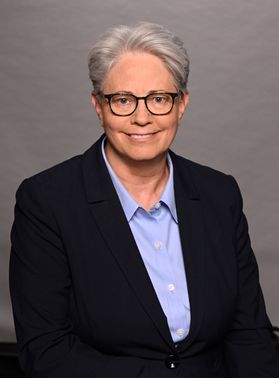Senate Faculty Chair Frankie Tack raised ethical concerns to administrators about the latest round of faculty cuts in the Business and Economics college.
BY: AMELIA FERRELL KNISELY – SEPTEMBER 28, 2023 5:55 AM
West Virginia University still has roughly $8 million to find in its campus budgets, and recent layoffs in the university’s Business and Economics college have raised concerns on campus about who else could be let go in an effort to find more savings.
Janet Fraser was one eight associate professors in the Chambers College of Business and Economics who learned on Sept. 22 that their contracts weren’t being renewed past May 2024.
She said the news, via a Zoom call, came as a shock. She has taught in the business data analytics program at WVU since 2017.
“I thought this job was secure,” said Fraser, 36. “I have no idea who is going to run my program, and I have no idea what to tell my students.”
WVU Communications Director April Kaull said in an email that Friday’s decision by the Chambers College regarding the non-renewals of eight faculty was separate from the ongoing Academic Transformation to deal with WVU’s $45 million deficit. Earlier this month, the school’s Board of Governors voted to eliminate 28 academic majors and 143 faculty positions as part of that process.

But, on Friday, John Chambers College of Business and Economics Dean Josh Hall sent an email to faculty about the job reductions in which he referenced the Academic Transformation, saying, “I am providing an update today on how those efforts impact our College.” Fraser shared the email with West Virginia Watch.
“The decision to not renew the contracts of eight teaching faculty for [fiscal year 2025] in response to the College’s budget deficit wasn’t made lightly,” Hall told West Virginia Watch in an email. “This was purely a budgetary decision guided by limited options based on prior reductions in staff positions and discretionary spending. While it is difficult to lose members of our Chambers College and WVU community, our focus remains on supporting our business students and positioning them for success.”
Faculty Senate Chair Frankie Tack said that in her mind, what happened Friday is part of the Academic Transformation. That matters, she said, because the Chambers College faculty members should have been subject to the same guidelines the university outlined for selecting the 143 faculty members to be eliminated (those notices are likely to go out next month).
According to university administration, the dean of Chambers College needed to shed $1 million from the college’s budget by a deadline, and the reduction in staff was in an effort to meet that goal.
“There’s an equitable, objective approach there,” Tack said. “For these eight on Friday, that approach wasn’t used.”
In an email, Kaull said, “These are examples of that College making its own decisions about how to manage its budget which ultimately contributes to the university’s overall budget.”
She continued, “Typically, non-renewals are issued in early spring of each year. By announcing earlier, the College was providing more time for those affected.”
While Tack said that Chambers College wasn’t required to handle the faculty reduction differently, she raised concerns to WVU administrators about whether race, gender or age were factors in determining who was let go.
“We have no idea how those eight were selected,” she said.
She continued, “As an advocate for the faculty, I’m saying that we can do better than that.”
Fraser said that what happened to her department sent a message to WVU faculty and staff that anyone’s job could be terminated.
“All that did on Friday was the administration telling you that Academic Transformation or not, no one is safe,” she said.
Mass jobs cuts likely over but unclear what’s next
University leaders have said that WVU’s $45 million deficit was largely driven by enrollment decline, though reports have noted that the university’s debt ballooned under President E. Gordon Gee’s leadership.
The debt grew 92% since Gee took over the university, the Charleston Gazette-Mail reported.
Though Gee told reporters that the Board of Governor’s sweeping cuts to faculty and academic programs would “squeeze out” the $45 million, the university still has roughly $8 million more to find in its ongoing review of programs, according to Tack.
University leaders want to deal with the $45 million gap by July 1, 2025. “We believe that the faculty reductions recently announced will result in $14 to $16 million in savings, but we won’t have a more precise total until after the Academic Program Portfolio Review RIF and non-renewal process is complete” Kaull said. Normal faculty decreases, like retirements, may help the efforts, she added.
Last week, university administrators announced job cuts in the university libraries and the Teaching and Learning Commons, though the exact numbers will not be shared until later this year. Administrators couldn’t say how much those decisions would make up for the financial shortfall.
Kaull said she wasn’t aware of any other faculty positions that could be eliminated, but noted, “However, colleges and other units across the university also regularly make their own personnel and operating decisions for any number of reasons.”
The Faculty Senate “advocated for a review of non-academic areas such as the Division of Student Life and others,” and those efforts are underway, Kaull added.

Tack said additional job loss could happen as part of that review.
“It’s a very uncertain time right now,” she said, adding, “If there’s any more on the faculty side, they won’t be in mass.”
In August, WVU General Counsel Stephanie Taylor said that additional faculty may face non-renewals outside of the positions identified for Reduction in Force in the Sept. 15 vote. A university website detailing the Academic Transformation said, “There currently are no firm or estimated numbers on the overall amount of positions that may be eliminated.”
Lisa Corrigan is a professor and political strategist in Arkansas with roots in the Ohio Valley, not far from Morgantown. She studies the evolving higher education funding model, and in August, she wrote for The Nation about WVU in a piece titled, “The Evisceration of a Public University.”
She said, from her point of view, there are “no guardrails” on the continuing Academic Transformation and whose jobs could be on the line.
“It seems to me that administrators would not want to be in the negative news cycle for so long and would release a coherent plan,” she said. “Here, it feels like it’s haphazard.”
She added, “I think the faculty cuts will stop when the people Gee reports to tell him they [have] to stop.”
University administrators have vowed to be transparent about the Academic Transformation, and Tack felt they’ve upheld that promise. Work began on the process years ago, according to Gee, and the university lost around 130 employees earlier this year as administrators tried to save $7 million.
“Despite accusations, there has been quite a bit of faculty involvement,” Tack said. “We’ve got to have input and shape things.”
On Wednesday afternoon, Fraser was preparing to meet with a student to talk about the future of her program. She wasn’t sure what she’d say.
She became emotional as she talked about searching for a new job and leaving WVU.
“Normally at graduation, I hug [my students], wish them good luck and tell them how proud I am of them. I don’t get to do that this time, and it hurts,” she said.
** West Virginia Watch is a nonprofit media source. Articles are shared under creative commons license. Please visit https://westvirginiawatch.com/ for more independent Mountain State news coverage.

